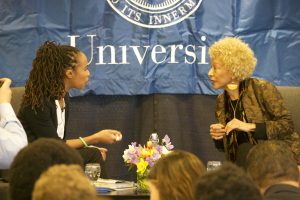Professor Jasmine Johnson (AAAS/WMGS) has received an award, in part, for inspired teaching, but one of her most inspiring teachers was Ula Taylor, an African-American studies professor she had at UC Berkeley. “There are moments sometimes in classes when you forget that it’s work,” Johnson said about Taylor, “and that was totally inspiring to me.”
Students at Brandeis may say the same thing about Johnson, whose courses “Performance and the Politics of Black Authenticity,” “Black Feminist Thought,” and others are popular across campus.
“In my classes, you can’t really just witness. You can’t just come and try to be invisible,” said Johnson, winner of the Michael J. Walzer award for scholarship and excellent teaching. “One, because why would you waste your own time trying to disappear, and two because the work is so important and the authors are so important.”

Taylor also taught her to be meticulously prepared for each class session and is the reason why Johnson is “over-prepared” as a professor. She does not want students to waste her time with a lack of effort, but she does not want to waste their time either.
To get the most from a class, students must not only be present, but be fully prepared on the day’s material, said Johnson. When they do this, Johnson is inspired in turn: “They show up with energy and I just match them.”
To make each class engaging for her students, Johnson relies on a variety of different methods depending on the subject matter. For performance-based classes, Johnson notes that performance itself is really engaging. She stresses that, no matter the form of the class, students must put in effort to engage with the material. She also uses social media. Once last year, she held a class discussion over twitter when the university was closed due to snow.
Johnson also engages her students on social media, tweeting articles relevant to class material and even using twitter to convey lecture material when class is cancelled, as happened the Spring 2015 semester due to snow. Her “Performance and the Politics of Black Authenticity” class uses the messaging platform Slack as a “warm-up” before class, and students in “Black Feminist Thought” are required to post certain assignments on Medium. Johnson wants her students to engage with a public that doesn’t necessarily care about the material, using succinct posts to “be able to convey the information to someone beyond the walls of Brandeis.”
“It’s my critical engagement in those disciplines that inspires me to show up to the classroom, because the material is so urgent and because everybody’s life is kind of on the line.” Johnson advised students to be honest with both what they know and what they don’t know. Ego, she said, often stops students from engaging critically and completely with material. The competitive environment college students often experience “really only privileges a particular kind of person, and that particular kind of person is raced and classed.”
Dance is an important part of Johnson’s work as well. She got involved with dance like most kids. “You know your parents put you in spaces … before you know what you actually like,” she said. Johnson would go to dance with her mother and her attachment to the medium grew through her scholarship related to dance.
Johnson is now writing a book on African dance and the diaspora, which is “largely ethnographic,” meaning she participated in many dance classes throughout her research.
The book examines how the industry of Western African dance in the bay area of New York City has transformed “from a pretty explicitly black American project to now an industry that’s nominated by young white women.” Johnson wants to examine the questions “How did this happen? And what are the racial and sexual politics of African dance?” Johnson expects the book to be released sometime in 2017.
Last year, Johnson had dancer and choreographer Camille Brown came to speak to her African dance class and lead an African dance workshop. Johnson was concerned about attendance, noticing that people are much more willing to try or critique music and theater than dance. However, she managed to attract a crowd of 60 students and Johnson said it was a “glorious” experience.
“When everybody stops talking and just moves, it’s a different kind of trust that you have to have to let go of your cool and to be embarrassed and to just be in community,” she said.
The Hoot interviewed three professors who won teaching awards this year. Read about Claudia Novack (CHEM) and Sarah Lamb (ANTH).


